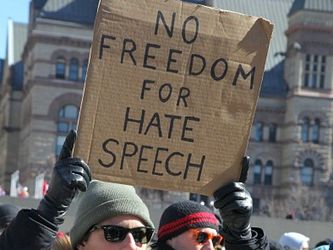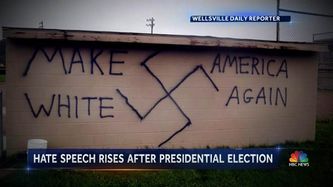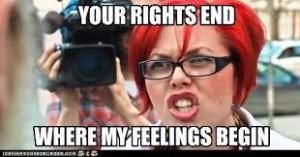"Hate speech"
(enemy image) | |
|---|---|
 | |
| Interest of | • Anti-Defamation League • Antifa • Center for Countering Digital Hate • Dangerous Speech Project • Amalric de Droevig • Tristan Mendès France • Jacob Mchangama • Media Diversity Institute • Holger Münch • Patriot Front • Southern Poverty Law Center • Marianna Spring • Stop Funding Hate • UNAOC • Humza Yousaf |
| An enemy image mobilised to facilitate legal restriction of free speech. | |
“If liberty means anything at all, it means the right to tell people what they do not want to hear.”
George Orwell [1]
"Hate speech" has a natural tension with freedom of speech. In recent years, an effort is being made in some countries to raise people's level of concern about it, for example by introducing legal restrictions about particular words. In US, opinion is fairly evenly divided about whether it should be made illegal to make public comments labelled as "hate speech".[2]
Contents
Official narrative
Wikipedia stated as of October 2017 that "A website which uses hate speech may be called a hate site. Many of these sites contain Internet forums and news briefs that emphasize a particular viewpoint.... There has been debate over freedom of speech, hate speech and hate speech legislation.[3] Critics have argued that the term "hate speech" is used to silence critics of social policies that have been poorly implemented.[4]
History

After the San Bernardino shooting of December 2015, Eric E. Schmidt, executive chairman at Google called on the industry to build tools to reduce hate, harm, and friction in social media, "sort of like spell-checkers, but for hate and harassment."[5]
By Country
German laws against "anti-hate" laws also prohibit various symbols such as the swastika. In 2017, "two Chinese tourists were arrested in Germany for photographing themselves making Hitler salutes outside the Reichstag building in Berlin."[6]
The UK Police arrested over 3000 people in 2016 because of what they posted on the internet.[7] In 2018, the UK government rejected a petition to end its expanded laws against hate speech.[8]
Corporate media
Ironically, the concept of "hate speech" is increasingly applied under the banner of tolerance, suggesting that certain ideas are inherently dangerous and risk "radicalising" people. On the internet especially, the commercially-controlled media are apply the label to "extremists" such as neo-nazis or any criticism of Israel. This "weaponisation" of speech is associated with increasing restrictions on freedom of speech on the internet.[9]
Internet Censorship
- Full article: Internet Censorship
- Full article: Internet Censorship
On May 31, 2016, Facebook, Google, Microsoft, and Twitter, jointly agreed to a European Union code of conduct obligating them to review "[the] majority of valid notifications for removal of illegal hate speech" posted on their services within 24 hours.[10] Jillian York of the EFF criticised the move, calling it an "Orwellian agreement"[11]
Internet anonymity
In 2019, the Austrian government was reportedly considering attempting to outlaw internet anonymity on the grounds of "hate speech".[12]
Related Quotation
| Page | Quote | Author |
|---|---|---|
| Joseph Goebbels | “Propaganda must facilitate the displacement of aggression by specifying the targets for hatred.” | Joseph Goebbels |
Related Document
| Title | Type | Publication date | Author(s) | Description |
|---|---|---|---|---|
| Document:The Sordid Origin of Hate-Speech Laws | article | 1 December 2011 | Jacob Mchangama | An in-depth analysis of the origins of modern western so-called 'Hate-speech' laws in the early post-WWII Soviet Union. |
References
- ↑ https://www.rutherford.org/publications_resources/john_whiteheads_commentary/the_omnipresent_surveillance_state_orwells_1984_is_no_longer_fiction
- ↑ http://www.renegadetribune.com/putting-word-hate-into-proper-context/
- ↑ Herz, Michael and Peter Molnar, eds. 2012. The content and context of hate speech. Cambridge University Press.
- ↑ "George Orwell meets the OIC". Human Events. Retrieved 10 October 2014.Page Module:Citation/CS1/styles.css must have content model "Sanitized CSS" for TemplateStyles (current model is "Scribunto").
- ↑ www.theverge.com/2016/4/13/11387934/internet-moderator-history-youtube-facebook-reddit-censorship-free-speech
- ↑ https://www.economist.com/blogs/gulliver/2017/08/don-t-mention-war
- ↑ http://www.breitbart.com/london/2017/10/14/british-police-arrest-at-least-3395-people-for-offensive-online-comments-one-year/
- ↑ http://www.breitbart.com/london/2018/01/28/tory-government-rejects-petition-free-speech-act/
- ↑ http://www.renegadetribune.com/putting-word-hate-into-proper-context/
- ↑ "Facebook, YouTube, Twitter and Microsoft sign EU hate speech code". The Guardian. Retrieved 7 June 2016.Page Module:Citation/CS1/styles.css must have content model "Sanitized CSS" for TemplateStyles (current model is "Scribunto").
- ↑ https://alethonews.wordpress.com/2016/06/03/european-commissions-hate-speech-deal-with-companies-will-chill-speech/
- ↑ https://www.thelocal.at/20190410/austria-mulls-user-registration-for-online-platforms


